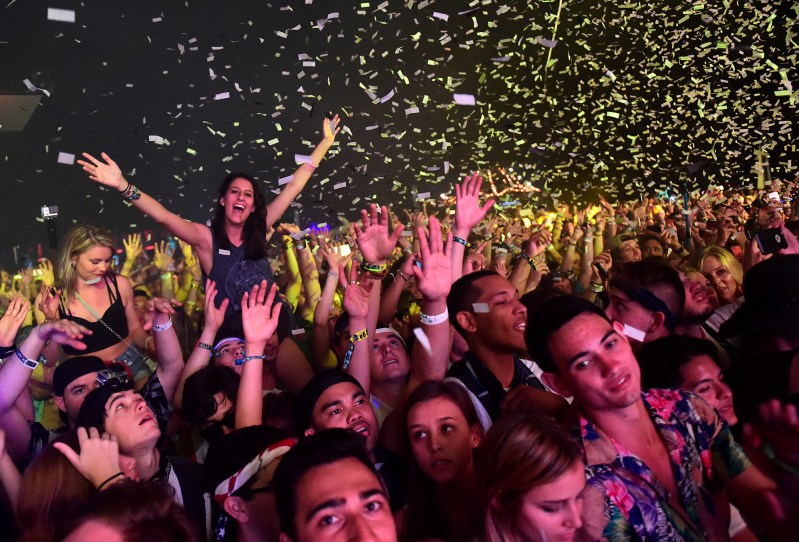
At this point in the pandemic, it’s hard to know if institutions before will ever be the same again. The music festival is one such gathering, something sacred that will almost surely have to be reimagined if it hopes to persist.
It’s a massive business so it’s hard to see it going away entirely; Time reports Coachella grossed $115 million in 2017. Festivals like Coachella and Pitchfork have streamed performances for years now, and it’s possible that the focus could shift to those recordings, potentially protected by a paywall. Attendees would essentially partake from home, watching Frank Ocean and Lana Del Rey (this year’s headliners) on their laptops or smart televisions. Presently, Coachella has rescheduled to mid-October. But if we’re hit with multiple waves of COVID-19, it’s tough to imagine 100,000 people coming together anytime over the next year or two.
The festivals that may have the brightest immediate future may be the smaller ones.
Promoters may look to assemblies such as Live From Out There for inspiration going forward. It managed to clear $100,000 over a weekend in late March, despite lacking any major artists. It was put together rapidly, in mid-March as other more traditional festivals were announcing postponements. Part of the proceeds went to relief for musicians, mostly falling out-of-work at the time, and a subscription format was set up for the audience.
Live From Out There went on to complete six consecutive weekends, featuring smaller bands like Twiddle and Pigeons Playing Ping Pong. It might just provide some framework for the likes of Austin City Limits, Bonnaroo, Governors Ball, and more. In fact, with the added interactive element inherent to a digital livestream (via realtime comments with the crowd), it could — rather ironically — bring the band and its fans closer than ever.

The festivals that may have the brightest immediate future may be the smaller ones. Gatherings like Huichica, launched by sixth-generation winemaker, Jeff Bundschu, about a decade ago in his native Sonoma. Its since expanded to Walla Walla and the Hudson River Valley. Last year, the Walla Walla leg of the series featured excellent indie bands like Destroyer, Yo La Tengo, Allah-Lahs, Fruit Bats, Waxahatchee, and more. The sets are accented with a wine country backdrop, wines, and farm-to-table grub. The Sonoma leg, originally scheduled for this June, has been postponed.
“We’ve always strayed from calling Huichica a ‘music festival’ because we designed it to be spread out across bucolic, open spaces” says Bundschu. “Since its inception, we’ve limited our guest count and ticket sales to ensure Huichica remains a very intimate experience — so we don’t anticipate our guests’ experience to change that much. Of course, we’ll be taking all appropriate measures to ensure that our staff and volunteers are safe and adhere to guidelines from the state and county.”
Pickathon in the rural outskirts of Portland is another good example. The festival is 20 years old and while it draws a reliable crowd of about 3,500 per day over a long summer weekend. It’s plausible that it would weather CDC guidelines as the layout is sprawling and caters to social distancing. There are multiple stages, most of which are outdoors, and many are connected by forested trails. With some newfound etiquette (6 feet, people) and a change in some of the more crowded, albeit small, sets like those that happen in an old barn, the show just might be able to go on.
“Since its inception, we’ve limited our guest count and ticket sales to ensure Huichica remains a very intimate experience.”
But for the Summerfest and New Orleans Jazz and Heritage Festivals of the circuit, something will have to give, at least this year and possibly next. The conversation now is already discussing the end of prior societal norms like offices and mass transit as we know it. We’ll still work and commute together, but how we’ll do so will likely shift. So, too, will the way we take in live musical performance (in fact, it already has).
Festivals will likely look into pandemic insurance for stability in the future. It’s not an option now, but as we learn more about the extent of things and what sizes of gatherings are allowed and when, safety net policies might make sense, at least for certain festivals. For now, though, organizers will have to swallow the losses and hope conditions look a bit better by autumn.
What’s important to remember about the music festival is that in most cases, it’s a perennial thing. It’s one, maybe two weekends per year. Like winemaking, you get one shot a year. Eliminating even a single SXSW has huge economic consequences. Crews that normally work year-round to prepare such gatherings aren’t doing so. The musicians aren’t getting paid. And this is to say nothing of the local economies that tend to thrive during these brief annual windows when tens of thousands, if not more, descend on their domains.

Technology may have to save the music festival. It may be the only safe route of replicating the experience of, say, dancing with 40,000 fellow humans to a live Daft Punk set in the sweltering desert. Virtual and augmented reality can certainly lend a hand. If we can bring Tupac back from the dead to perform with Snoop, can’t we mimic the sweaty, packed-to-the-gills general admission pit from your favorite fest, right at home?
As a diehard music fan who loves the live show and the tangible assembly of interested fans, it’s a tough pill to swallow. However, I think there are too many creative people invested in the institution for it to change to a point where it’s not still quite enticing.


